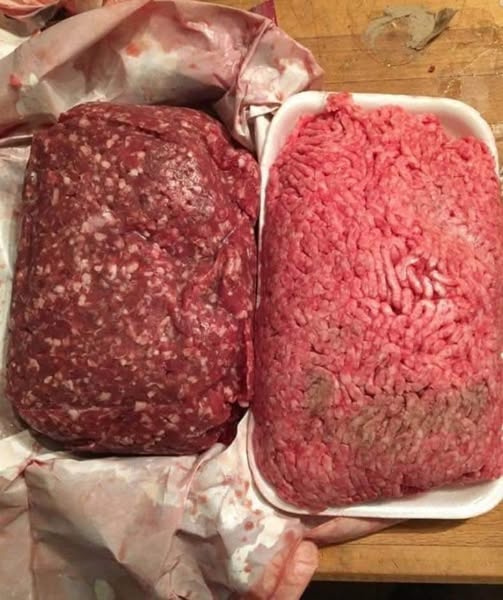When deciding what type of beef to purchase, the choice is far more impactful than it may seem at first glance. This decision goes beyond taste and quality, influencing your health, ethical values, and even the environment. The distinctions between store-bought and farm-raised beef are significant, with each option presenting unique characteristics and implications. By understanding these differences, you can make informed choices that better align with your priorities.

One of the most noticeable characteristics of store-bought beef is its uniform, pinkish color. This visually appealing trait, however, isn’t a natural quality of the meat itself. Instead, the color is achieved using preservatives and additives like propyl gallate, which are designed to extend the beef’s shelf life and make it more attractive to consumers. While these chemicals are effective in keeping the meat looking fresh, they also introduce artificial substances into the food, which some consumers may find concerning.
Store-bought beef is typically sourced from industrial farms where large-scale production is prioritized. To maximize efficiency, cattle are often raised in confined spaces and fed a grain-heavy diet that may be supplemented with growth hormones and antibiotics. This approach allows producers to lower costs and meet high consumer demand. However, it also raises concerns about the meat’s quality and the potential health risks associated with consuming beef treated with antibiotics and hormones. For instance, the routine use of antibiotics in livestock can contribute to the development of antibiotic-resistant bacteria, which poses a serious public health risk.
On the other hand, farm-raised beef offers a very different approach. Sourced from smaller, often family-run farms, this type of beef is produced with an emphasis on natural farming practices and ethical animal treatment. Cattle on these farms are usually allowed to graze freely on grass, their natural diet, which improves their quality of life. This grass-fed diet not only benefits the cattle but also enhances the nutritional profile of the meat.
Farm-raised beef is known for its rich flavor and superior nutritional value compared to its store-bought counterpart. It contains higher levels of omega-3 fatty acids, which are essential for heart and brain health, and is lower in unhealthy saturated fats. Additionally, farm-raised beef is often free from growth hormones and antibiotics, making it a cleaner and more natural choice for those who prioritize their health.
Beyond health benefits, the environmental impact of farm-raised and store-bought beef is another key distinction. Industrial farming, which produces most of the beef found in grocery stores, is a significant contributor to environmental issues such as greenhouse gas emissions, deforestation, and water pollution. These farms require massive amounts of grain to feed the cattle, which often leads to unsustainable agricultural practices. By contrast, smaller farms that produce pasture-raised beef have a much lower environmental footprint. Allowing cattle to graze naturally on grass contributes to healthier soil and ecosystems, making this approach more sustainable in the long run.
Ethics is another factor that sets farm-raised beef apart. Many consumers feel more comfortable supporting farms that prioritize humane treatment of animals. Cattle raised on smaller farms often live in open pastures with plenty of space to roam, a stark contrast to the crowded, confined conditions of industrial feedlots. Choosing farm-raised beef not only supports ethical farming practices but also helps sustain local agriculture and smaller farming communities.
However, it’s important to acknowledge that farm-raised beef is often more expensive than store-bought options. The higher cost reflects the time, labor, and resources required to raise cattle naturally and humanely. While this price difference may deter some consumers, others see it as an investment in better quality meat and a more sustainable food system. Supporting local farmers also fosters a stronger connection to where your food comes from, offering peace of mind about the practices involved in its production.
Ultimately, the decision between store-bought and farm-raised beef comes down to your personal values and priorities. If convenience and cost are your primary concerns, store-bought beef might be the more practical choice. But if you value higher-quality meat, better nutrition, ethical farming practices, and reduced environmental impact, farm-raised beef is a compelling alternative.
By understanding the key differences between these two types of beef, you can make more thoughtful decisions that align with your health goals and ethical beliefs. Whether you choose store-bought or farm-raised beef, being informed about the options ensures that your choice is deliberate and in line with your values.





